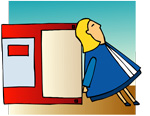 |
| Home | Our Books | Fun Tests | Minding Your Memory | Glossary | Six Functions | Who We Are |
Memory
and Concentration From The Editors at the Brainwaves Center |
|||||||||
Nothing could be farther from the truth. In many cases, your brain will not remember something until it has interpreted it in a personally meaningful way. For the most part, remembering something demands your full, active participation. “Objective memory” is an oxymoron. Never underestimate your ability to forget. Your whole life — at age 5, 15, 35 — you’ve demonstrated expert skill at forgetting things, and you’ll remain that way until the end of your days. How does it help to know that? For one thing, it changes the questions you have to answer. Instead of asking “Why do I forget?” maybe what you should really be asking is “Why do I remember?” That question has many answers, but if you’re worrying about your memory the simplest answer is probably this: because you paid attention. The memory systems of concern here – the ones that most people are concerned about – are ones that are accessible to consciousness. Those are the memory systems that handle memories of facts about the world (sometimes known as “knowledge”) and more personal memories of doing a certain thing with a certain person at a certain time. The older you get, the more knowledge you have, for the most part. So why do people complain about their memory as they age? In part because it becomes harder for the brain to learn and remember new things. That seems surprising, in a way. After all, if you remember things by interpreting them in a personally meaningful way, the more experiences you have had in your life the easier it should be to do that. The main reason it becomes harder to learn new things is that your brain’s processing speed gradually slows. It becomes harder to do more than one thing at once, so it’s easier to get confused. Your brain may also become less flexible, so it’s harder to change learning strategies in mid-stream. All these things mean it becomes harder to focus. There’s nothing you can do to change your brain’s processing speed. So far, researchers haven’t found a way to upgrade your brain’s hard drive the way you can do with a computer. But there’s a lot you can do to increase your learning performance even if your processing speed has slowed. It’s all in the techniques you apply. |
|||||||||
|
| Building
Mental Muscle Over 230,000 copies sold in the USA alone, plus translations into 14 languages worldwide. |
|

|
Brains
That Work a
Little Bit Differently 2nd best seller. Used in college Psychology courses. ADHD, Left Handedness, Autism, DejaVu, Child Geniuses |
 |
Building
Left-Brain Power It handles the details, like language skills. Every-day tips to use what you learn. Mental exercises that, when done, release serotonin, a feel-good hormone. |
 |
Learn
Faster & Remember More Three guides in one: How skills develop and are maintained through life: 1. Womb to adolescence; 2. Professional Years; 3. Slowing down the slowing down |
 |
Brain
Building Games With Words & Numbers Skill-graded challenges: easy to hard, logic, numbers, crypto-visual plus tricks to maximize performance in every one (176 of them). Another top seller. |
 |
Use
It or Lose It! As the mind matures it begins to lose essential abilities unless.... it is forced to work. Then it builds connections again into old age. |
 |
Exercises
for the Whole Brain A breast-pocket full of visual mental-teasers to work out in spare moments. Now in 13 languages. Especially good for designers and creative thinkers. |
 Right-Brain Teasers Right-Brain TeasersHow many of these photos of 60 old-time, household artifacts can you figure out how they worked and what they were used for? This taps the visual-spatial skills in your right brain. (Men are surprisingly good at this). See an interesting, detailed description when you turn the page after each photo. A fun Valentine gift , especially for elderly antique collectors and flea-market addicts. |
|
^ Back to top of page


